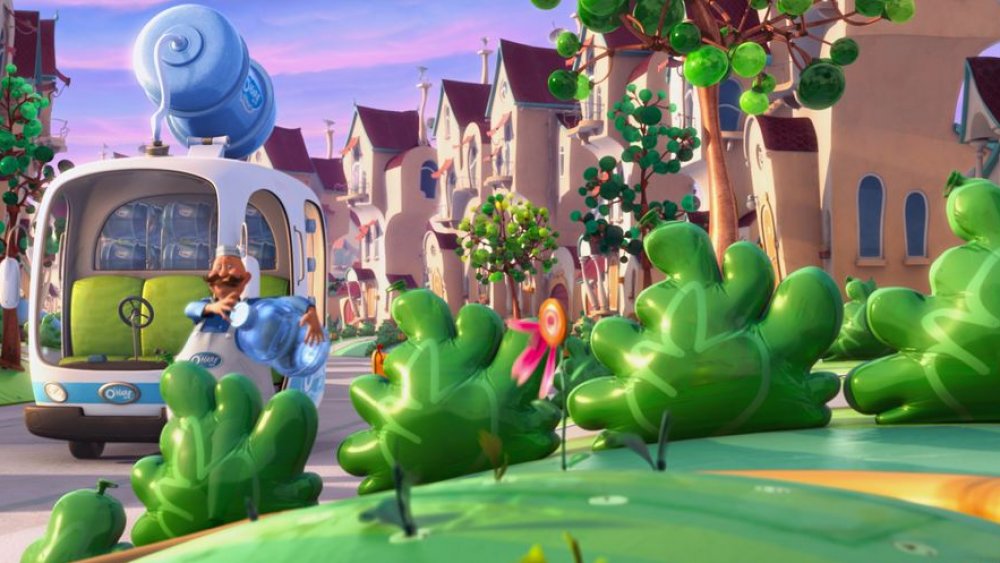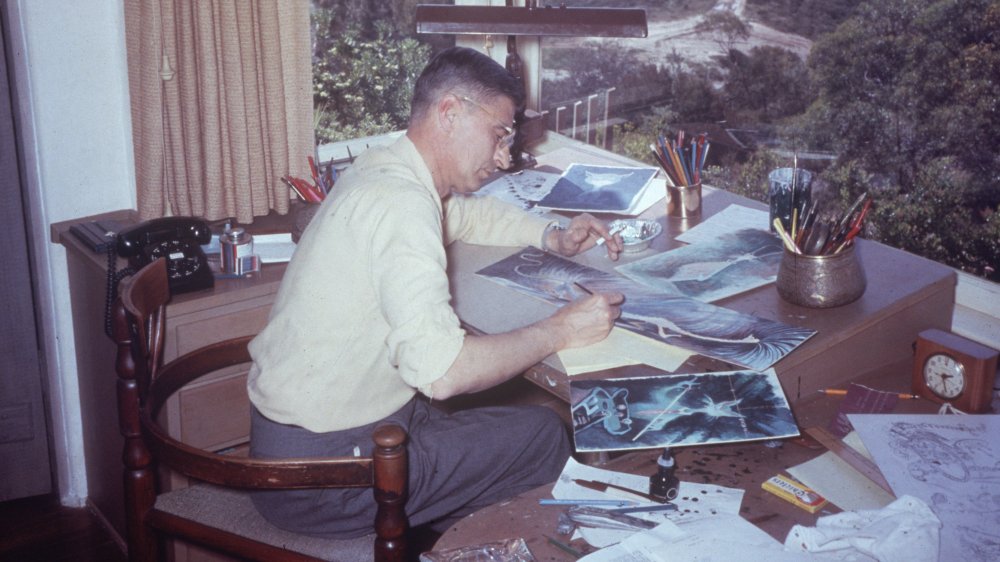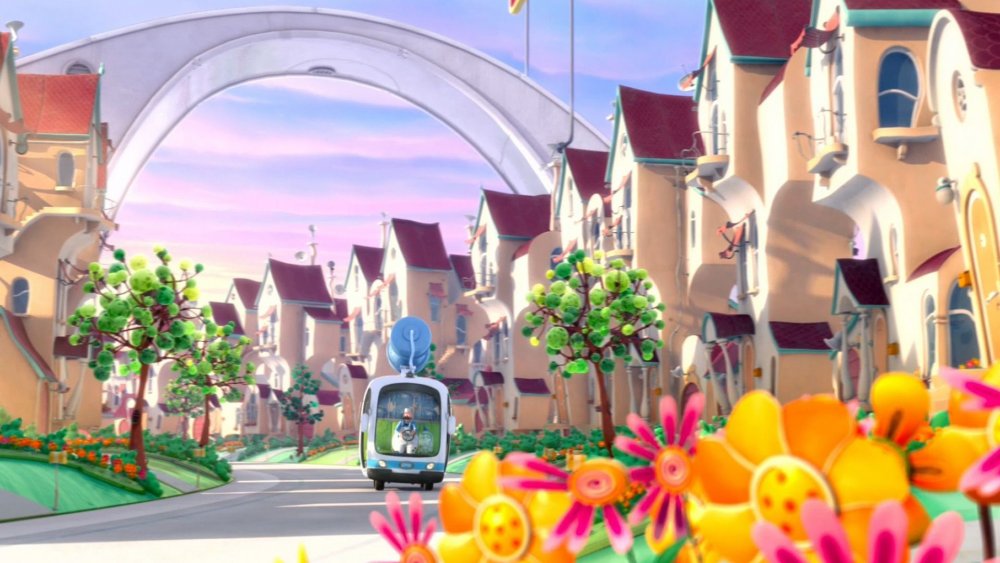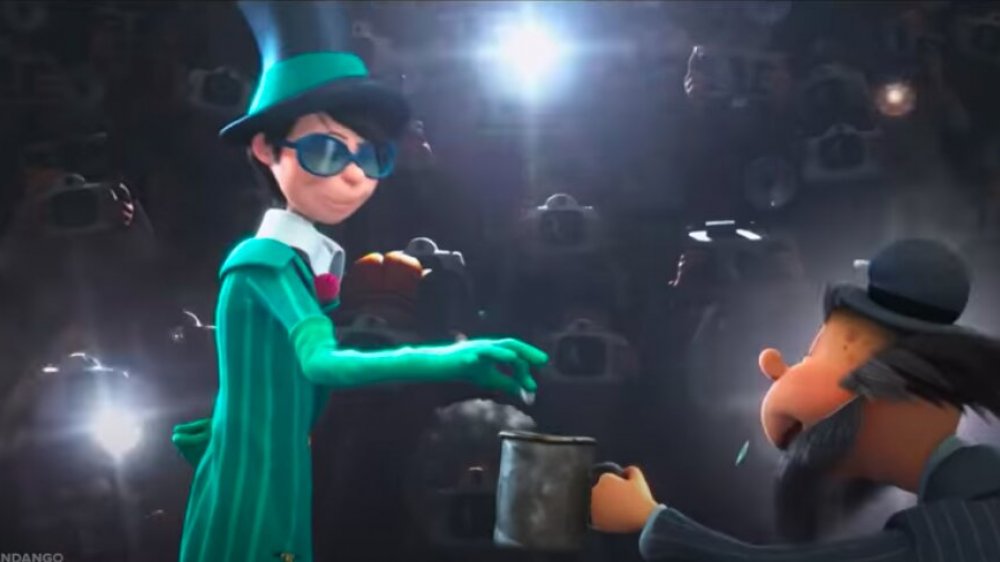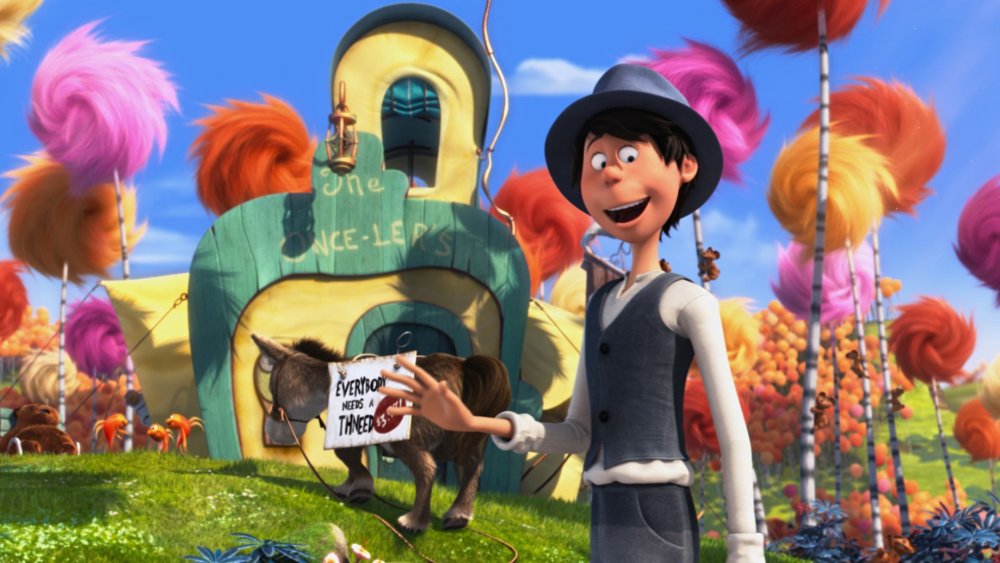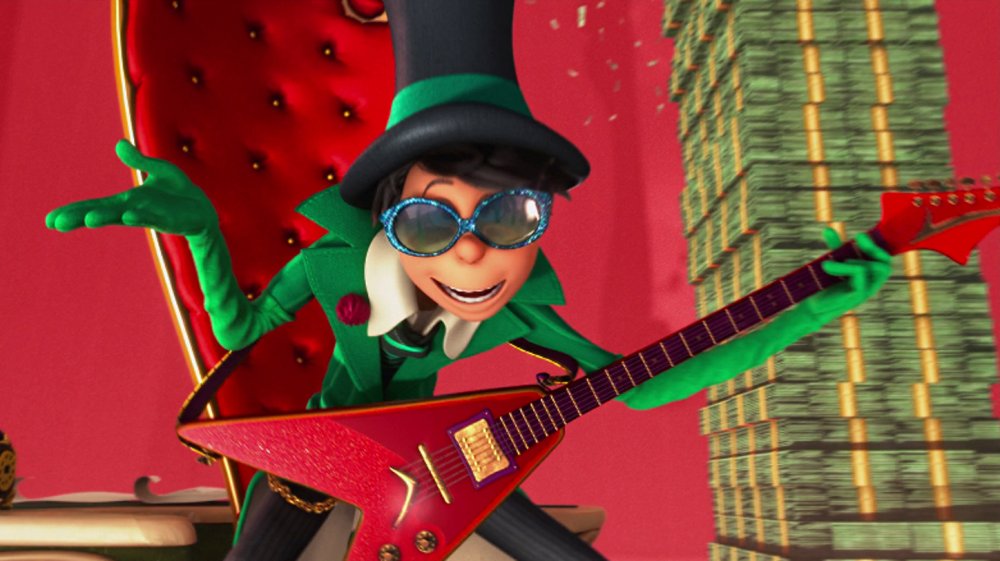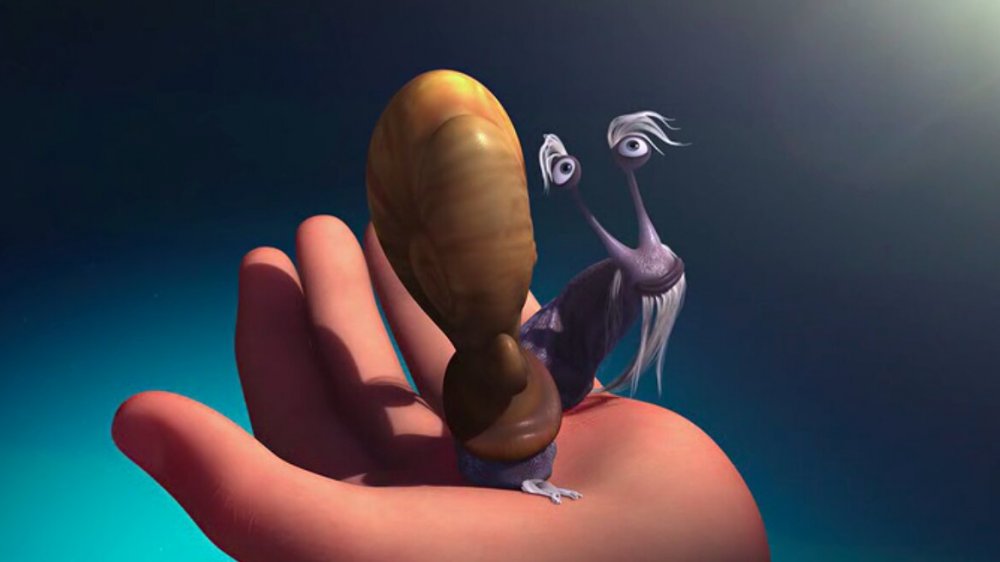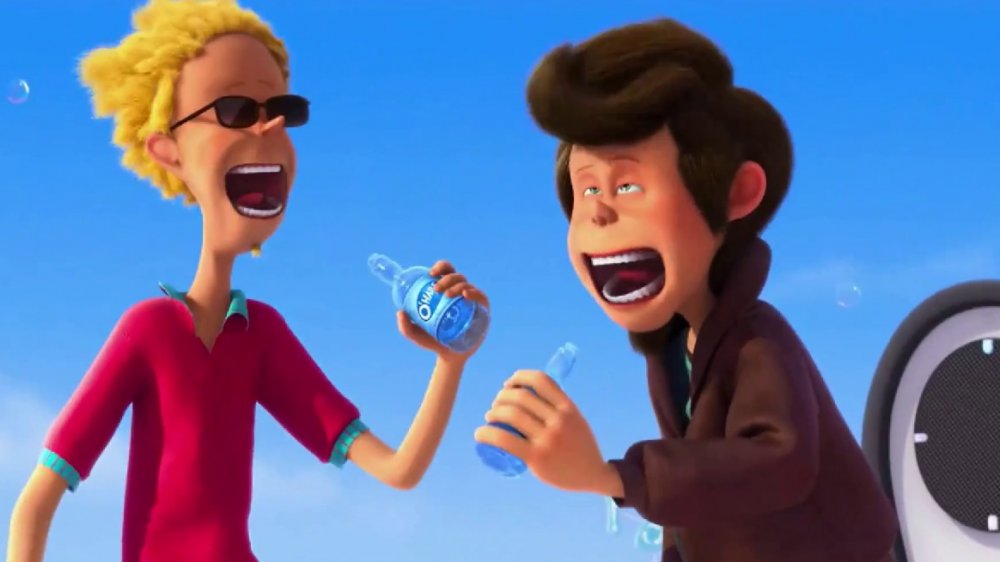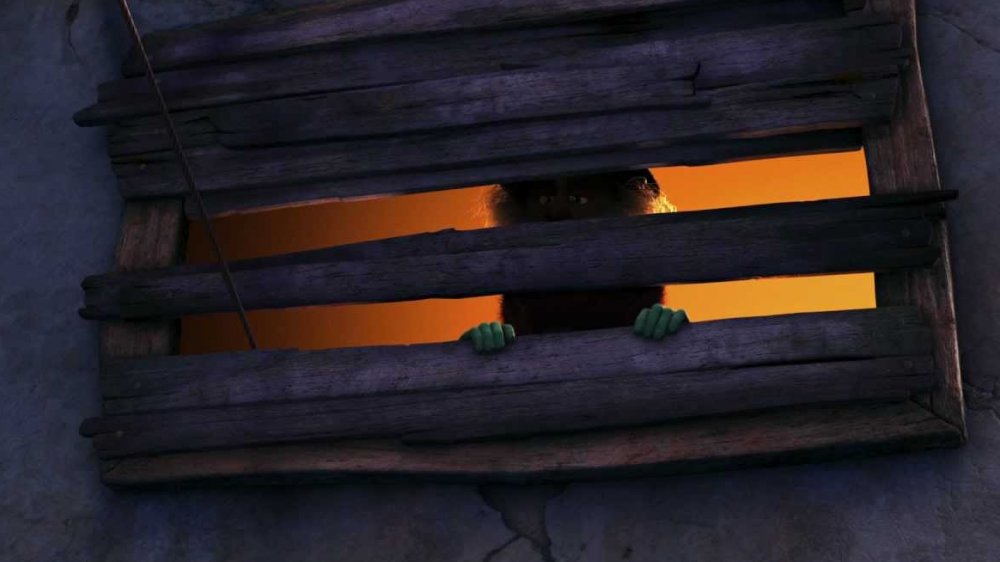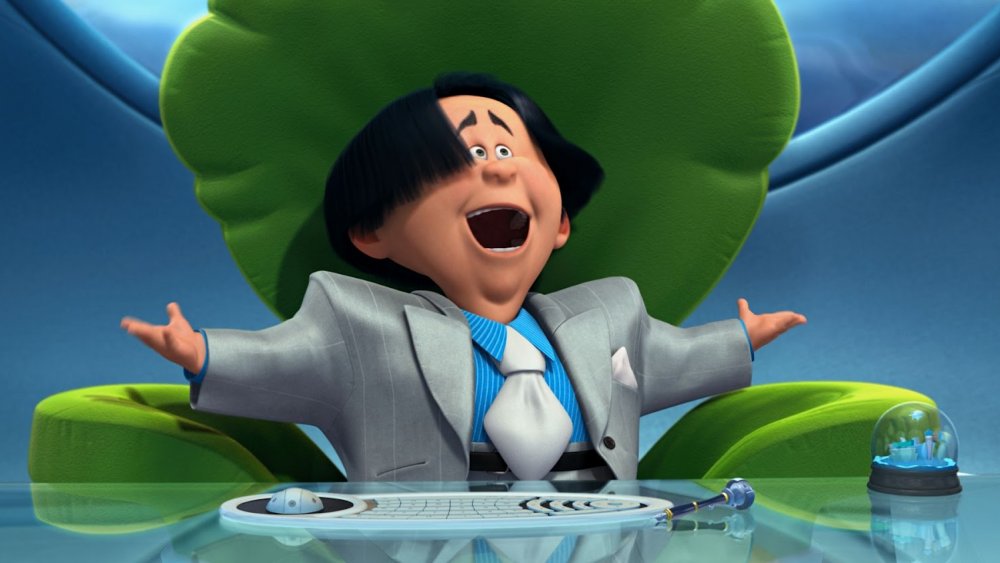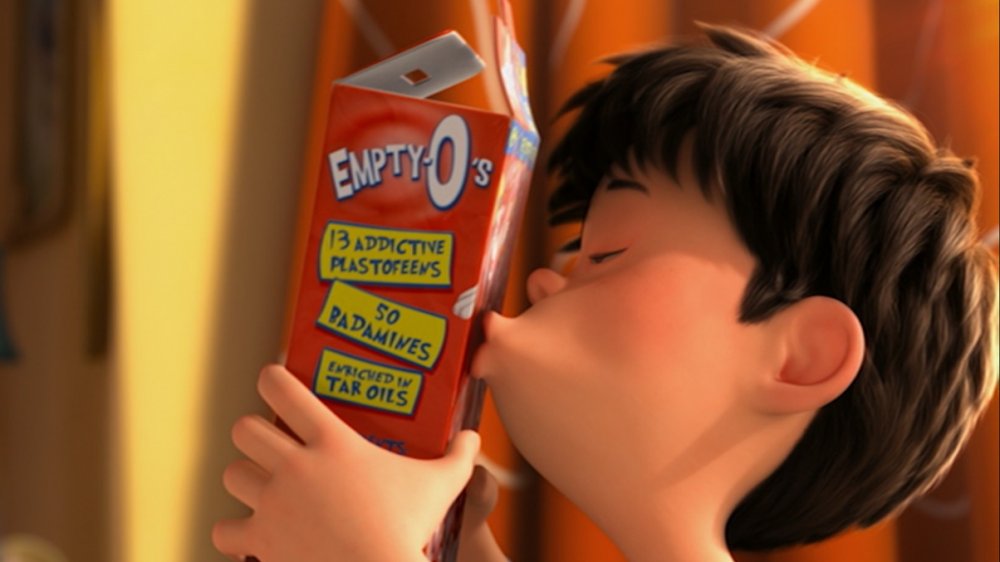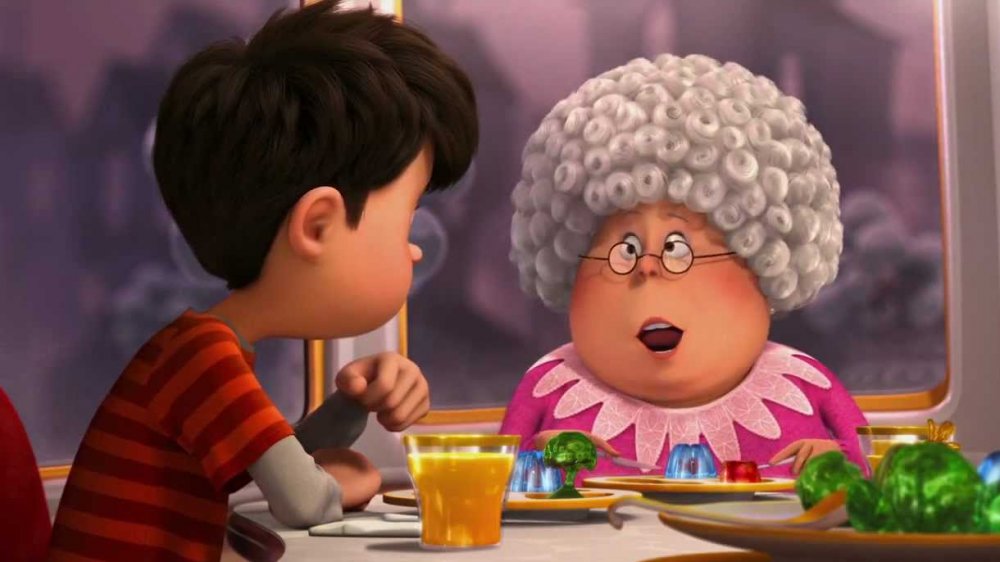Things Only Adults Notice In The Lorax
If people had been saying "OK, boomer" in 2012, the phrase would almost definitely have worked its way into the dialogue of The Lorax. Themes from the movie seem like a call to action for the new generation to correct the transgressions of those that came before them, and consequently an indictment of older generations for neglecting to preserve the world for future ones. This has only become a more common thread in entertainment and activism since the film's premiere.
The movie's commentary on generational obligations to the environment, morality, and the common good of a community means that there is a message in it for everyone. Yes, it's an animated musical based on a rhyming children's book. The goofy characters, bright colors, and disobedience to authority attract younger viewers. But adults can find a lot to think and laugh about in The Lorax as well. Though one of the arguments is that sometimes children understand things better than adults do, it's also a fact that there are many connections in this movie you'd only make as an adult. So relax, pop open a cold bottle of air, and check them out!
The product doesn't matter as much as the packaging
The air delivery people in The Lorax aren't just delivering air — they're basically meant to be reminiscent of the bygone profession of the milkman. Certainly some people in certain areas of the country still get their milk delivered today, but the average child wouldn't get the visual reference and might think that the delivery people are meant to be more like mailmen.
In reality, the portrayal of air delivery people as milkmen is a bit retro for the futuristic environment of the film. And yet air delivery is advertised as elite and efficient, a.k.a "the future," when really it's just repackaging (literally) an old idea for a profit.
One of the explicitly stated pitches for bottled air on the go, in fact, is that if you put things in plastic bottles, people will buy them no matter what they are. It doesn't matter if the product is something people don't need or if the purported futuristic qualities are actually the opposite. All that matters is the packaging. Any parent who has had to shepherd their children past a shelf of colorful toys in the store can attest to that.
Older pop culture references
Everyone knows who Lorax author Dr. Seuss is, but his real-life story is something an adult is more likely to know. As an homage to Theodor Seuss Geisel, Lorax characters Ted and Audrey are named after the writer and his second wife — but the relationship between Ted and Audrey in The Lorax can also be read as a very subtle tribute to Geisel and his first wife.
Geisel allegedly proposed to Helen Palmer while they were riding a motorcycle. (When she said yes, he crashed, and true to the absurd, almost slapstick sensibility of Seuss' work, they were more amused than injured.) Throughout the film, we see Ted riding around on his little electric bike and often giving Audrey a ride as well. If there is a little bit of Helen's story there, however, it's bittersweet, given the hauntingly tragic story of their love and her demise — a story that a child certainly wouldn't know.
On a more lighthearted note, current and former rockers might note that the Once-ler plays a guitar, which people used to call an axe — fitting for someone who made his living chopping down trees.
The microcosmic culture of the town
The current residents of Thneedville might not even know that the town used to be called Greenville, as you can see in a flashback. Now it's clearly the opposite of green, with nothing natural in sight, but you can artificially visit any locale or climate you want. Any kind of fun is available year-round, with surfing on one corner and snowboarding on the other. O'Hare has essentially created a self-contained "world" just the size of a town. In practice, this unsustainable way of life would involve so many wasteful habits and resources that it would actually create a climate crisis and destroy year-round weather patterns as we know them.
There are a lot of snow globes everywhere, with models of people's own houses or of Thneedville, that reinforce this idea of living in a no-consequence bubble of artificiality. When you live in a bubble, it's easy to discredit issues you can't even see. How can the citizens of Thneedville be expected to care about the environment? There is no environment in Thneedville, because everything is artificial and self-contained. The only problems in Thneedville are ones that have been invented by and for their specific world and already have (marketable) solutions.
National history and political references
The Once-ler, at the height of his success, is seen petting a puppy and making donations in front of cameras at a rally, like a politician kissing babies. (In his song, he asks, "How bad can I be? Look at me petting this puppy. How bad can I be? A portion of proceeds goes to charity.") Adults, of course, have long since realized that people and organizations, especially high-profile ones, are determined to look good whether or not they really are.
If you look closely, you can see the words "Too Big To Fail" on the Once-ler's office wall, calling out from a blown-up magazine cover. This phrase references the banking and mortgage crisis of 2008, triggered by large economic organizations using catastrophically irresponsible methods to increase their bottom line. The entire country paid the price, and Thneedville appears to be on the verge of a similar crisis. Their children are turning radioactive in their swimming holes!
Speaking of radioactivity, the pollution scenes act like specific visual callbacks to images of the Industrial Revolution. In all, the movie makes many allusions to periods throughout history in which profit and economic "progress" won out over the common good. Because of that, it's funny to notice all the merchandising tie-ins for a movie that fairly unsubtly condemns corporations: Illumination Entertainment, which produced The Lorax, struck at least 70 different product integration deals.
The Thneed = they need
As invented by Dr. Seuss for The Lorax, a "thneed" is defined as "A useless product which is advertised as being needed by everybody, but which in fact no one needs." Comparing it to a word like "s'mores," a contraction of "some more," we might infer as adults that "thneed" is a contraction of "they need" — a reference to the way you can market just about anything, whether or not there's a genuine need for it.
A seller can do this because it's about creating a perceived need that appeals to people and then fitting the product into it, like creating pollution to sell more air. This, in turn, inspires cynicism about all sorts of things as people grow up and learn more about the world — like the (debunked) idea that Valentine's Day was invented by greeting card companies.
Air, of course, is something that everyone actually needs. What the people in Thneedville don't realize, and what we might not really think critically about until we're adults, is that just because you need something doesn't mean it has to be sold to you. Many providers must first create a scarcity (real or imagined) before they can actually sell their product. They steal a basic need from the public and sell it back. This works best in a closed system like the insular Thneedville or, as the citizens actually call it in their opening song, "Got-All-We-Need-ville."
The soundtrack mirrors the themes of the movie
In a good musical, the soundtrack does much of the work of shepherding the audience through the film and reinforcing its themes. The first song audiences hear in The Lorax, which establishes the setting and introduces Thneedville, is electronic, with few, if any, acoustic instruments — fitting for a piece music whose job is to introduce the viewer a futuristic, artificial place.
When the citizens of the former Greenville arrive en masse and demand more Thneeds, the rhythm and harmony makes them sound like a church choir. The Thneed is not necessarily a religion, but it does become the basis for their way of life. The Once-ler builds a cult of personality and commodity around himself and his invention.
Finally, the closing number, "Let It Grow," is almost all acoustic, and at some points even a cappella. It's the most "natural" song of the film. All you need to make music with the instrument of the human voice is air.
Biology trivia and humor
Ted's grandmother instructs him to bring the shell of a "Great-Great-Great-Grandfather snail" to the Once-ler if he wants to hear the story of the trees. Only an adult, and a well-read or trivia-loving one at that, would know that most snails are actually considered hermaphrodites — so there is no such thing as a great-great-great-grandfather snail. Or maybe every snail can be a great-great-great-grandfather snail, if they live long enough? Either way, it's interesting that Ted was able to procure a snail's shell at all in a town so devoid of natural life.
Nature is so far removed from everyone's mind that no one even knows about photosynthesis. When Audrey uses the term to explain how trees make clean air on their own, for free, O'Hare says photosynthesis is a fake word. Ironically, the word the whole town is based on is actually fake. But if you'd grown up in a town named for a fake word, it would be real to you, and if you'd never heard the word photosynthesis, it would sound like something made up by a guy in a tin foil hat. What you've always known is what comes most naturally.
One of the songs actually talks about "just doing what comes naturally," but what it actually describes is doing what comes artificially. The number starts by invoking "survival of the fittest" and ends with trying to generalize laws of nature to business in order to excuse the takeover of the forest.
Monopolization
Air is ubiquitous in The Lorax. Well, it's ubiquitous everywhere, because we need oxygen to live. But in Thneedville, air is a commodity, and if you pay extra attention to all the places it's used, you can see just how big the air monopoly really is.
We see it replace all kinds of everyday, highly marketed products. In one scene, O'Hare's employees pitch bottled air that you can take "on the go." The disclaimer on their proposed ad states, "Please breathe responsibly," which is obviously a reference to alcohol. They sell the bottled air in six-packs and depict ecstatic party-goers throwing open a cooler of them and having the time of their lives.
There's also a Diet O'Hare option, which will draw a laugh from any adult who has ever tried to go on a diet and realized that companies will milk it for all it's worth. There's a diet version of everything! (Even though air doesn't have calories in the first place. Or maybe O'Hare invented caloric air just to sell diet air.)
O'Hare's car also runs on air, so there's a gasoline comparison as well. During the opening number, one of Ted's neighbors uses an air pump to inflate (and ultimately explode, whoops) the shrubs in his front yard, suggesting that all the fake greenery relies on an air supply, too. Basically, air replaces a slew of commodities and necessities, which constitutes extreme monopolization (a big-kid word).
The significance of the Once-ler's gadgets
The Once-ler's place is full of hand-operated, simple-machine-type gadgets and inventions. He is depicted as very skilled with his hands and extremely inventive, from playing guitar to producing the Thneed. But his gadgets are more than hobbies or home accents. He doesn't appear to use anything powered by electricity. This energy-saving lifestyle choice suggests environmental awareness, which he would have developed after the disastrous exploitation of the forest.
When the Once-ler peeks through his boarded-up windows, the light behind him doesn't look artificial at all. Instead, a soft glow emanates from some point behind him and doesn't even illuminate the whole room, leaving shadows on the walls furthest from the light. This, combined with the warm orange color, makes it seem like he's burning a candle and contributes to the electricity-free aesthetic.
But there might even be a little more to it. In addition to being energy-efficient, his lifestyle is also primitive compared to that of the outside world. As such a great inventor, he probably could have built an ultra-modern home that was just as carbon neutral, if not more so. And yet he chose to revert instead, perhaps because of his traumatic knowledge of the price one pays for irresponsible stewardship.
The background design of even the modern features
Many items of decor in Ted's house look like plants or other elements of nature. These design features are never at the forefront of any scene. Instead, they operate only in the background, as features of convenience and decor rather than integrated with people's lives as nature should be.
But even though the natural world has been forgotten by most at this point, it still represents something people want to have around — something they find aesthetically pleasing. The furniture often sports swirling viney accents, and Ted's mother has a set of floor lamps that look like tall, spindly stems ending in multicolored mushroom caps. One building downtown looks like a watermelon or cactus with its green-striped design, and O'Hare's own chair looks like it's made of leaves.
Even in its absence, nature is able to inspire the environment in Thneedville in a way that goes beyond simply being replaced with a blow-up replica. Nature also finds a way to express its annoyance at being uprooted, or so it seems: The designs on the fake shrubs look a lot like middle fingers.
And you thought sugary cereal was bad
One thing a parent might notice watching the Lorax is how out of touch Thneedville's parents seem to be with the welfare of their children. Some of their kids glow radioactively after playing in the city's water, but their mothers and fathers mostly just shrug it off.
In the real world, there are insidious threats hidden everywhere, let alone in plain, glow-in-the-dark sight. A lot of parents, for example, don't let their kids have sugary cereal. A pretty common fear is that the sugar will cause their children to be hyperactive to the point of acting out or missing bedtime. Many parents also worry that their children will become addicted to sugar, which would only exacerbate any other problems it causes. Most terrifying of all, there has been a lot of discussion over the years as to whether sugar causes cancer.
But you know what definitely causes cancer? Cigarettes. And The Lorax alludes visually to the oft-invoked "cigarette tar" used (rightly) to try to scare children away from picking up the habit. The box for Empty-O's boasts that the cereal is "enriched in tar oils." But where that would normally come on a Surgeon General's Warning label today, for Empty-O's, it's actually a selling point, along with 13 addictive "plastofeens" and 50 "badamines."
History repeats itself
In flashbacks, the Once-ler and the girl he likes look like Ted and Audrey, which kids might notice, but they might not connect it with the way history repeats itself. People don't seem to even wear Thneeds in modern Thneedville, alluding to the transience of fads, but the impermanence of a fad is what makes them so reliable. As adults, when we need to save money or declutter, we (ideally) practice delayed gratification by reminding ourselves that we don't need the current new thing, because the next next new thing is only a few months away. When your parents didn't get you what you wanted for Christmas, did you ever hear "You're just going to get tired of it in a few weeks anyway?"
Adults become wearily aware of the cycles that govern their lives, but these are hard enough to explain to a kid on the "brand new toy" scale, to say nothing of the "changing the world" scale. The discouraging paradox is that when you're young and idealistic enough to take action, you are also more innocent and unaware of what needs to be changed. However, as you grow up and learn more about how the world works, the knowledge can make you too cynical to try to change anything.
Ultimately, it's Granny and the Once-ler's stories combined with Ted and Audrey's hope that saves the trees. So even though history repeats itself, it can also be where real change starts.

